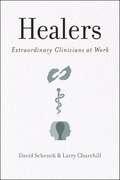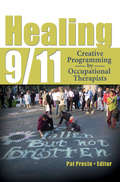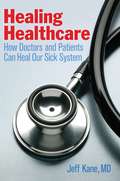- Table View
- List View
Heal Your Mind, Rewire Your Brain: Applying the Exciting New Science of Brain Synchrony for Creativity, Peace and Presence
by Patt Lind-KyleBreakthroughs in the scientific understanding of how the brain works have shown us that our brains are constantly rewiring themselves in response to events in our lives. This handbook applies this new science in practical ways, by giving us a training program to re-pattern our behavior and thereby change the ways our brain is wired. It interrupts our suffering, sharpens our mental abilities and corrects our cognitive imbalances. As we learn these mental skills, the neural patterns of our brains begin to change and we literally reprogram the neural networks through which information and energy flows. If you've heard about neuroplasticity, epigenetics, psychoneuroimmunology and other scientific advances, but didn't know how you could apply these breakthroughs to improve your life, you will find Heal Your Mind, Rewire Your Brain a treasure trove of resources. It provides a clear, step-by-step program that shows you how to correct the imbalances of the stressed-out brain, and install a peaceful state of mind.
Heal Yourself!
by Mark James Estren Beverly A. PotterDoctors think they heal with drugs. But only living cells can heal. When something is out of balance, your cells move to correct it because bodies want to be well. HEAL YOURSELF! HOW TO HARNESS PLACEBO POWER shows how to tap into this mysterious process to get well and stay well by harnessing your body's natural healing power-the power of placebo.These amazing effects are not just "in the mind." They can be observed and measured in the body's physiology. When patients believe in the treatment, ulcers heal, warts disappear, cancer goes into remission, swelling reduces-cells actually look different under the microscope. When your doctor believes in the treatment, the impact is even more powerful -not in every case, of course. But in enough that science now accepts that something is going on!HEAL YOURSELF! explains how researchers believe that the stress response creates an environment that promotes physiological breakdown, while the relaxation Response creates a healing environment. HEAL YOURSELF! offers specific things you can do, and do today, to turn on your body's innate healing mechanisms, including meditation, prayer, laughter, listening to music and rocking, Qi Gong, gratitude and forgiveness, and more.healing mechanisms.
Heal Yourself: Practical Methods On How to Heal Yourself From Any Disease Using the Power of the Subconscious Mind and Natural Medicine.
by Max CorradiHeal Yourself includes two different healing approaches using the subconscious mind and natural medicine. Part One offers a complete list of healing methods using the most powerful of all human resources, the subconscious mind. You will learn how powerful the mind is in every process of healing and you will learn how to work with those natural and fundamental laws of mind and nature like the Law of Cause and Effect and the Law of Vibration. Through these simple but effective methods you will be able to re-programme your subconscious mind. In part two the book provides information about natural medicine like phytotherapy, homeopathy, advanced complex homeopathy, homotoxicology, micotherapy, nutrition and low-dose embryo therapy for cancer. It also includes a comprehensive list of natural medicine protocols for a wide variety of health conditions and a compendium of low-dose homeopathic hormones, citokines and growth factors with their main indications.
Heal: The Vital Role of Dogs in the Search for Cancer Cures
by Arlene WeintraubHow man&’s best friend could help cure man&’s greatest scourge: &“An Emperor of All Maladies for dog lovers&” (Dr. Sarah Boston, author of Lucky Dog: How Being a Veterinarian Saved My Life). Drawn from extensive research, on-the-ground reporting, and personal experience, this book explores the fascinating role dogs (and cats) are playing in the search of cures for cancer. Learn how veterinarians and oncologists are working together to discover new treatments—cutting-edge therapies designed to help both animals and people suffering from cancer. Heal introduces readers to the field of comparative oncology by describing several research projects aimed at finding new therapies for cancers that are similar in dogs and people, including lymphoma, osteosarcoma, breast cancer, melanoma, and gastric cancer. The author, who lost her sister to gastric cancer, also writes about the emerging science behind the remarkable ability of dogs to sniff out early stage cancer and the efforts underway to translate that talent into diagnostic devices for early detection of the disease. In the course of bringing these dogs and their human companions to life, Arlene Weintraub takes her own personal journey from grief to healing, as she shows how man&’s best friend might be the key to unlocking the mysteries of cancer. &“Readers will share Weintraub&’s growing appreciation for the canine and feline subjects (and their owners) who are helping to advance cancer research.&” —Publishers Weekly
Healed Under the Mistletoe (Scottish Docs in New York #2)
by Amalie BerlinA precious gift……to mend his scarred heart.In this Scottish Docs in New York story, when Dr. Lyons McKeag finds an anonymous gift in his locker, he’s furious! But nurse Belle Sabetta isn’t fooled by his brooding, Scrooge-like exterior… Her own experiences of loss means she knows a little kindness, especially at Christmas, can go a long way. And Bella’s innocence and passion could be the gift that heals Lyons’s damaged heart.Scottish Docs in New York duetBook 1 — Their Christmas to RememberBook 2 — Healed Under the Mistletoe“Another wonderful second chance book…. Enjoy their journey back to love.” Goodreads on Back in Dr Xenakis’ Arms“I believe readers get an absolutely charming and enthralling read in this book that captivated me right from the start….” Harlequin Junkie on The Rescue Doc’s Christmas Miracle
Healed by Her Army Doc: Healed By Her Army Doc (bondi Bay Heroes) / Rescued By Her Mr Right (bondi Bay Heroes) (Bondi Bay Heroes #3)
by Meredith WebberHer army doc returns……but can she tell him her secret?In this Bondi Bay Heroes story, general surgeon Kate Mitchell is reunited with Dr. Angus Caruth—the gorgeous army doc she spent one night with three years ago. Working together on the Specialist Disaster Response team reignites their flame, but before Angus moves on again will Kate finally be able to share their secret heartache…and believe their temporary fling can lead to forever?
Healed by His Secret Baby: Healed By His Secret Baby / Best Friend To Doctor Right (Mills And Boon Medical Ser.)
by Louisa HeatonAn unexpected baby made him a father…But she’ll make them a familyGP Cole Branagh’s cozy Cotswolds surgery is all he wants and needs. Which is why he’s determined to help beautiful new nursing assistant Lane Carter get settled quickly! Until she rocks his world by introducing him to her baby goddaughter, who she’s caring for…and reveals he’s the father. Cole knows he’ll need Lane’s help navigating unexpected parenthood—he’d just never planned on needing her, too…
Healed by Their Unexpected Family: Falling For Her Army Doc / Healed By Their Unexpected Family (Harlequin Lp Medical Ser. #2)
by Karin BaineTwo heartbroken strangers… brought together by their baby!Midwife Kayla was only intending to be a surrogate. But after tragedy strikes, she’s unexpectedly thrown into the role of mother! Plus, the biological father—eternal bachelor doctor Jamie—wants to be involved! Kayla’s wary of his determination; she’s learned the hard way that her trust is often misplaced. But as the heat between them rises, can she trust him enough to let him into her life…and her heart?From Harlequin Medical Romance: Life and love in the world of modern medicine.“Their One-Night Twin Surprise is an absolutely adorable story with all the emotions and tensions. Author Karin Baine weaved this story of betrayal, friendship, loneliness, love and family amid the medical drama in a spell-binding way to the pages. Recommended for all readers of medical romance.”—Goodreads“Karin Baine is a phenomenally talented writer of contemporary romances who writes books that are so poignant and well-written that they never fail to tug at the heartstrings…. Midwife Under the Mistletoe is a searingly emotional Medical Romance that is powerfully written, wonderfully emotional and absolutely breathtaking.”—Goodreads
Healed by the Midwife's Kiss: Healed By The Midwife's Kiss (the Midwives Of Lighthouse Bay, Book 2) / Reunited By Their Baby (the Larches Practice, Book 3) (The\midwives Of Lighthouse Bay Ser. #2)
by Fiona McArthurFinn can’t imagine loving anyone again…But could one woman change that forever?After Dr. Finn Foley’s wife abandoned him and their adorable baby daughter, he threw himself into being a father. But when he meets a kindred spirit in widowed midwife Catrina Thomas, he can’t resist getting to know her better. One sizzling kiss later, the happiness Finn has been searching for finally seems within his grasp…if only he’s willing to claim it!
Healer: A Novel
by Carol CassellaFrom national bestselling author Carol Cassella comes the story of one doctor’s struggle to hold her family together through a storm of broken trust and questioned ethics.Claire is at the start of her medical career when she falls in love with Addison Boehning, a biochemist with blazing genius and big dreams. A complicated pregnancy deflects Claire’s professional path, and she is forced to drop out of her residency. Soon thereafter Addison invents a simple blood test for ovarian cancer, and his biotech start-up lands a fortune. Overnight the Boehnings are catapulted into a financial and social tier they had never anticipated or sought: they move into a gracious Seattle home and buy an old ranch in the high desert mountains of eastern Washington, and Claire drifts away from medicine to become a full-time wife and mother. Then Addison gambles everything on a cutting-edge cancer drug, and when the studies go awry, their comfortable life is swept away. Claire and her daughter, Jory, move to a dilapidated ranch house in rural Hallum, where Claire has to find a job until Addison can salvage his discredited lab. Her only offer for employment comes from a struggling public health clinic, but Claire gets more than a second chance at medicine when she meets Miguela, a bright Nicaraguan immigrant and orphan of the contra war who has come to the United States on a secret quest to find the family she has lost. As their friendship develops, a new mystery unfolds that threatens to destroy Claire’s family and forces her to question what it truly means to heal. Healer exposes the vulnerabilities of the American family, provoking questions of choice versus fate, desire versus need, and the duplicitous power of money.
Healers On Healing
by Richard Carlson Benjamin Shield W. Brugh JoyIn thirty-seven original essays written for this book, some of the world's leaders in healing explore their personal and professional experiences in order to uncover the underlying principles on which all healing rests. Rather than focusing on diverse techniques, the writers seek the "golden thread" that ties together the wide range of approaches to healing. In simple, direct language, the contributors explore the complex nature of healing from many viewpoints. We hear from physicians, psychologists, nurses, metaphysical healers, and shamans. Their topics include: what healing really is and how it takes place the power of the healer within what to look for in a healer the function of spirituality in healing the dramatic effects of the healing relationship the role of attitudes and emotions love as a healing force healing and death The result is a grand synthesis of heartfelt thinking that offers a treasury of profound insights for people in the healing professions, people who seek to develop their own healing capacities, people who wish to benefit from healers, and anyone interested in the magical properties of human relationships.
Healers: Extraordinary Clinicians at Work
by Larry R. Churchill David SchenckIn this groundbreaking volume, David Schenck and Larry Churchill present the results of fifty interviews with practitioners identified by their peers as "healers," exploring in depth the things that the best clinicians do. They focus on specific actions that exceptional healers perform to improve their relationships with their patients and, subsequently, improve their patients' overall health. The authors analyze the ritual structure and spiritual meaning of these healing skills, as well as their scientific basis, and offer a new, more holistic interpretation of the "placebo effect. " Recognizing that the best healers are also people who know how to care for themselves, the authors describe activities that these clinicians have chosen to promote wellness, wholeness and healing in their own lives. The final chapter explores the deep connections between the mastery of healing skills and the mastery of what the authors call the "skills of ethics. " They argue that ethics should be considered a healing art, alongside the art of medicine.
Healing 9/11: Creative Programming by Occupational Therapists
by Pat PrecinGet a first-hand look at the ongoing tragedy of 9/11 Healing 9/11 examines programs and interventions created and implemented by occupational therapists to aid those affected directly-and indirectly-by the 9/11 attacks. Ideal for courses in trauma and recovery, community interventions, disaster recovery, health programs and implementation, and mental health interventions as well as for professionals, this powerful book chronicles the experiences of OTs who worked with firefighters, burn victims, and displaced workers, as well as children, students, and clients suffering long-term symptoms of depression and anxiety. These first-hand accounts offer rare insights into the healing process for victims of terrorism (including OTs themselves), and serve as a guide to developing outreach and counseling services to those touched by future incidents. Healing 9/11 continues the work of Surviving 9/11: Impact and Experiences of Occupational Therapy Practitioners (Haworth), presenting detailed personal and professional accounts from OTs who provided physical, emotional, and psychosocial relief to thousands of disaster victims. This unique book reveals how OTs provided aggressive manual therapy, wound care, and scar management to the critically injured; how OTs analyzed the job market and found work for people who had lost their livelihoods; how OTs worked with students in classroom settings to relieve their anxieties; and how OTs helped rescue workers at Ground Zero deal with the emotions that threatened to overpower them.Healing 9/11 examines: nontraditional group therapy non-clinical treatment settings burn rehabilitation pediatric occupational therapy school-based occupational therapy employment planning occupational frame of reference creative arts therapy post traumatic stress disorder and much more Healing 911: Creative Programming by Occupational Therapists is an essential resource for all healthcare professionals who offer relief in times of disaster.
Healing America
by Roger BulgerIn this book a physician long involved in health policy issues at the national level presents a wise, achievable vision for American health care. From his wide ranging professional experiences and his personal experiences with three life threatening illnesses, he charts a uniquely American "epidemiology of hope" that flows from the country's vast medical research investments and technology transfer capabilities; challenges patients and health professionals alike to recognize a central decision making role for the patient on the healing team; and offers thought-provoking insights into physician-patient communication, the placebo effect, suffering, dealing with death and dying, and the nature of the social contract between those in the healing business and those seeking to be healed. Most important, after provocatively grading American health care from B-plus to D in relation to hope, mercy, justice, and autonomy, the book proposes a new metric, the Organizational Therapeutic Index (OTI), for assessing and improving our health care system.
Healing Arthritis: Your 3-Step Guide to Conquering Arthritis Naturally
by Dr Susan Blum M.D., M.P.HArthritis is the most common cause of disability in the world--greater than both back pain and heart disease. One example, Rheumatoid Arthritis (RA), is the most common autoimmune disease, affecting 1% of the UK population, and almost 68 million people worldwide. Conventional medicine tends to treat arthritis with strong, gut-damaging, immune-suppressing pain medications, temporarily relieving the symptoms of the disease without addressing its root causes. Now, in her groundbreaking new book, Dr. Susan Blum, a leading expert in functional medicine, offers a better approach to healing arthritis permanently.Dr. Blum's groundbreaking three-step protocol is designed to address the underlying causes of the condition and heal the body permanently by:Treating Rheumatoid Arthritis, Osteoarthritis, and moreHealing your gut to heal your jointsReducing inflammation without medicationDr. Blum's innovative method includes a two-week plan to quickly reduce pain through anti-inflammatory foods and supplements; followed by an intensive gut repair to rid the body of bad bacteria and strengthen the gastrointestinal system for a dramatic improvement in arthritis symptoms and inflammation; and then addresses the emotional issues that contribute to inflammation, and eating a simple, Mediterranean inspired diet to maintain a healthy gut.Featuring detailed case studies, including Dr. Blum's own inspiring personal story, Healing Arthritis offers a revolutionary way to heal your gut, repair your immune system, control inflammation, and live a happier, healthier life...arthritis-free.
Healing Brain Injury with Chinese Medical Approaches: Integrative Approaches for Practitioners
by Douglas S. WingateLearn to treat symptoms of traumatic and acquired brain injury using Chinese medicinal methods of acupuncture and herbal medicine. Covering both Western and Chinese medicine understandings of the brain, the book provides a thorough exploration of treatment options, including multiple acupuncture systems, Chinese herbal formulas, dietary and orthomolecular recommendations, and standard biomedical approaches. Many symptoms associated with brain injury can be effectively addressed or reduced using TCM, including chronic headache, fatigue, dizziness, pain, and anxiety among others. The book highlights the special considerations that should be taken when working with people with brain injury, as well as when treating particular subpopulations, including pediatrics and veterans.
Healing Children: A Surgeon's Stories from the Frontiers of Pediatric Medicine
by Kurt NewmanAn “astounding and miraculous ” (Madeline Levine) medical memoir by one of our nation’s leading pediatric surgeons-- the visionary head of Children’s National Anyone who has seen a child recover from a wound or a broken bone knows that kids are made to heal. Their bodies are more resilient, more adaptive, and far more able to withstand acute stress than adults’. In this inspiring memoir, Dr. Kurt Newman draws from his long experience as a pediatric surgeon working at one of our nation’s top children’s hospitals to make the case that children are more than miniature adults. Through the story of his own career and of the brave kids he has treated over the years—and their equally brave and tenacious parents—he reveals the revolution that is taking place in pediatric medicine. When he decided to become a pediatric surgeon, the field was in its infancy, struggling for esteem. Now, nearly forty years later, it is at the forefront of exhilarating new discoveries in everything from cancer research to mental health care. But few parents know how to access the best care for their children. Far too many find themselves frustrated and afraid. Dr. Newman wrote this book to help guide parents—not just of sick kids but of all kids —and to share his knowledge of what children need to thrive. A deeply human story with a spectacular cast of young heroes and heroines, Healing Children will convince you that we still have a lot to learn from our kids.
Healing Fibroids: A Doctor's Guide to a Natural Cure
by Elena Oumano Allan WarshowskyAn exciting new approach to regaining health without surgery!Fact: By the time they reach menopause forty percent of American women have at least one uterine fibroid; 600,000 women are diagnosed each year. Fact: Fibroids are the leading cause of hysterectomy, the second most common surgical procedure performed on women. Fact: Natural, holistic medicine can heal fibroids without invasive surgery. Fibroid tumors, while usually benign, can swell a woman's uterus to the size of a basketball, frequently causing heavy menstrual bleeding, cramping, bladder infections, and even infertility. Most doctors recommend surgery as the only answer. Now this innovative holistic program brings new hope for a surgery-free life to millions of American women. Dr. Allan Warshowsky combines traditional Western medicine and holistic science to cure not just the fibroid condition but also the underlying imbalances and systemic dysfunctions that can cause fibroids. With an exciting program of diet, exercise, supplements, herbs, and mind/spirit work, Dr. Warshowsky shows fibroid sufferers how to become the strong, healthy women they deserve to be.
Healing Foods, Healthy Foods: Use superfoods to help fight disease and maintain a healthy body
by Gloria Halim Samantha RussoCutting out processed and junk foods from your diet and introducing the superfoods listed in this book will help you boost your immune system, fight illness, and increase your energy levels. Superfoods are rich in vitamins, minerals and anti-oxidants. This book lists them individually and explains why they are so good for you and how they can help keep you healthy. It also lists a number of spices which have medicinal benefits in their own right. By combining these spices with some of the superfoods, this book includes some simple but delicious recipes that have their roots in the Mediterranean, Asian and African regions, all of which are known to be among the world s healthiest diets. There are mouthwatering salads, wholesome soups, delicious main courses and vegetable dishes, fresh juices, and nutritious smoothies. You really are what you eat. With this book to guide you, you can change your eating habits for the better and make a difference to your general health.
Healing Gotham: New York City’s Public Health Policies for the Twenty-First Century
by Bruce F. BergNew York City provides the ideal context for studying urban public health policy.Throughout its history, New York City has been challenged by a variety of public health crises. Since the nineteenth century—when it became one of the first American cities to develop a comprehensive public health infrastructure—New York has also stood at the forefront of formulating and implementing urban health policy. Healing Gotham examines in depth how the city has responded to five serious contemporary public health threats: childhood lead poisoning, childhood asthma, HIV/AIDS, obesity, and West Nile virus.Bruce F. Berg examines the rise and incidence of each condition in the city while explaining why the array of primary tools utilized by urban policy makers—including monitoring and surveillance, education, regulations, and the direct provision of services—have been successful in controlling public health problems. He also argues that forces such as race and ethnicity, New York City’s relationship to the state and federal government, the promotion of economic development, and the availability of knowledge related to preventing, treating, and managing illness all influence effective public health policy making.By contrasting these five particular cases, this exciting study allows scholars and students to compare public health policy through time and across type. It also helps policy makers understand how best to develop and implement effective public health strategies around the United States.
Healing Healthcare: How Doctors and Patients Can Heal Our Sick System
by Jeff KaneNot long ago, "bedside manner” was a physician’s most potent medicine. Now that skill has dwindled to bland, generic amiability, and has been all but lost behind today’s compelling healthcare technology. The bedside manner’s shrinkage would be tolerable if medical high tech could cure everything, but these amazing tools are alarmingly cost-ineffective in treating most patients--those who suffer from chronic, incurable illnesses and the effects of detrimental lifestyles. Paying far too much for too little return, Americans are understandably demanding healthcare reform, which we’re told lies in rearranging national finances. But beyond financial adjustment, authentic reform will have to come from reinstating ancient, intimate healing relationships between patient and doctor. Healing Healthcare describes how we arrived at this sorry impasse and where we need to go with a system that is as damaging to its doctors as it is to patients. Dr. Jeff Kane pinpoints and examines America’s love affair with medical technology, insistence on evading death at any cost, and practice of enabling unhealthy lifestyles. At its heart, Healing Healthcare shows that healing can begin only once doctors see patients clearly as individuals, and that through intimate contact, suffering can be productively treated.
Healing Hearts
by Syndi PowellNow that she’s healed…can she heal him? Armed with a clean bill of health, ER doctor April Sprader is ready to check off items on her bucket list. After meeting Zach Harrison, number four—start dating—shoots to the top. But the workaholic sports agent and caregiver has no spare time. Unless April can persuade Zach that this could be a second chance for them both…
Healing Hearts: A Memoir of a Female Heart Surgeon
by Kathy E. MagliatoAn inspiring, surprising, sometimes shocking, and ultimately deeply informative memoir of the high-stakes, high-pressured life of a female heart surgeon Dr. Kathy Magliato is one of the few female heart surgeons practicing in the world today. She is also a member of an even more exclusive group--those surgeons specially trained to perform heart transplants. Healing Hearts is the story of the making of a surgeon who is also a wife and mother. Dr. Magliato takes us into her highly demanding, physically intense, male-dominated world and shows us how she masterfully works to save patients' lives every day. In her memoir, we come to know many of those patients whose lives Dr. Magliato has touched: a baby born with a hole in her heart, a ninety-four-year-old woman with a lethal tear in her aorta, and a thirty-five-year-old movie producer who saves her own life by recognizing the symptoms of a heart attack. Along the way, Dr. Magliato sheds light on the too often unrecognized symptoms of a heart attack and cardiovascular disease--the number one killer of women in America--and the specific measures that can be taken to prevent it. As we begin to see what it takes for Dr. Magliato to heal hearts day after day, we come to understand a more human side of the medical profession. Dr. Magliato celebrates with her patients when they overcome their disease and personally mourns when they die as a result of it. She understands deeply the pain and suffering that heart disease can wreak on patients as well as on their families. Healing Hearts is not only her story, it is also the story of everyone affected by heart disease--roughly one in three Americans.
Healing Hepatitis C
by Christopher Kennedy Lawford Diana SylvestreGet the facts about Hepatitis C Having hepatitis C can be a transformative, extremely tough experience--especially without the right information. Healing Hepatitis C remedies that by combining the personal story of Christopher Kennedy Lawford, who unknowingly contracted the virus during his years of drug use, with the medical expertise of Dr. Diana Sylvestre, who has devoted her career to treating hepatitis C sufferers. Together they deal with the stigma and misinformation, and the fears and frustrations of this illness. Healing Hepatitis C serves as a valuable sourcebook for medical and treatment information: from what hepatitis C is to what it does, and from what to expect during treatment to how to communicate with your physician, to finding the support you need. Most of all, it walks you through the process of facing the diagnosis and treatment head-on, showing you that it is possible to get through hepatitis C--to be cured of it--without surrendering your life to it. Together Lawford and Sylvestre offer hope, humor, and medical expertise to help patients, their friends, and families navigate the numerous challenges of hepatitis C virus education, testing, and treatment.
Healing Her Boss's Heart
by Dianne DrakeDaring to love again…When handsome surgeon Jack Hanson returns home, he’s not looking for love. His guilt over his wife’s death means he’s never going to risk his heart again! But feisty new employee Carrie Kellem can’t help but intrigue him…Carrie’s tough childhood has made her independent; she doesn’t need anyone! Until she meets Jack… And suddenly Carrie wishes she wasn’t alone. Can she help Jack to let go of the past and see that he has a future with her?
























